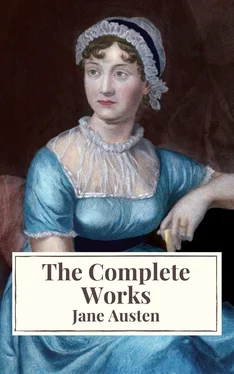"You are very wrong, Mr. Willoughby, very blamable," said Elinor, while her voice, in spite of herself, betrayed her compassionate emotion; "you ought not to speak in this way, either of Mrs. Willoughby or my sister. You had made your own choice. It was not forced on you. Your wife has a claim to your politeness, to your respect, at least. She must be attached to you, or she would not have married you. To treat her with unkindness, to speak of her slightingly is no atonement to Marianne—nor can I suppose it a relief to your own conscience."
"Do not talk to me of my wife," said he with a heavy sigh.— "She does not deserve your compassion.—She knew I had no regard for her when we married.—Well, married we were, and came down to Combe Magna to be happy, and afterwards returned to town to be gay.—And now do you pity me, Miss Dashwood?—or have I said all this to no purpose?— Am I—be it only one degree—am I less guilty in your opinion than I was before?—My intentions were not always wrong. Have I explained away any part of my guilt?"
"Yes, you have certainly removed something—a little.— You have proved yourself, on the whole, less faulty than I had believed you. You have proved your heart less wicked, much less wicked. But I hardly know—the misery that you have inflicted—I hardly know what could have made it worse."
"Will you repeat to your sister when she is recovered, what I have been telling you?—Let me be a little lightened too in her opinion as well as in yours. You tell me that she has forgiven me already. Let me be able to fancy that a better knowledge of my heart, and of my present feelings, will draw from her a more spontaneous, more natural, more gentle, less dignified, forgiveness. Tell her of my misery and my penitence—tell her that my heart was never inconstant to her, and if you will, that at this moment she is dearer to me than ever."
"I will tell her all that is necessary to what may comparatively be called, your justification. But you have not explained to me the particular reason of your coming now, nor how you heard of her illness."
"Last night, in Drury Lane lobby, I ran against Sir John Middleton, and when he saw who I was—for the first time these two months—he spoke to me.—That he had cut me ever since my marriage, I had seen without surprise or resentment. Now, however, his good-natured, honest, stupid soul, full of indignation against me, and concern for your sister, could not resist the temptation of telling me what he knew ought to—though probably he did not think it WOULD—vex me horridly. As bluntly as he could speak it, therefore, he told me that Marianne Dashwood was dying of a putrid fever at Cleveland—a letter that morning received from Mrs. Jennings declared her danger most imminent—the Palmers are all gone off in a fright, &c.—I was too much shocked to be able to pass myself off as insensible even to the undiscerning Sir John. His heart was softened in seeing mine suffer; and so much of his ill-will was done away, that when we parted, he almost shook me by the hand while he reminded me of an old promise about a pointer puppy. What I felt on hearing that your sister was dying—and dying too, believing me the greatest villain upon earth, scorning, hating me in her latest moments—for how could I tell what horrid projects might not have been imputed? ONE person I was sure would represent me as capable of any thing— What I felt was dreadful!—My resolution was soon made, and at eight o'clock this morning I was in my carriage. Now you know all."
Elinor made no answer. Her thoughts were silently fixed on the irreparable injury which too early an independence and its consequent habits of idleness, dissipation, and luxury, had made in the mind, the character, the happiness, of a man who, to every advantage of person and talents, united a disposition naturally open and honest, and a feeling, affectionate temper. The world had made him extravagant and vain—Extravagance and vanity had made him cold-hearted and selfish. Vanity, while seeking its own guilty triumph at the expense of another, had involved him in a real attachment, which extravagance, or at least its offspring, necessity, had required to be sacrificed. Each faulty propensity in leading him to evil, had led him likewise to punishment. The attachment, from which against honour, against feeling, against every better interest he had outwardly torn himself, now, when no longer allowable, governed every thought; and the connection, for the sake of which he had, with little scruple, left her sister to misery, was likely to prove a source of unhappiness to himself of a far more incurable nature. From a reverie of this kind she was recalled at the end of some minutes by Willoughby, who, rousing himself from a reverie at least equally painful, started up in preparation for going, and said—
"There is no use in staying here; I must be off."
"Are you going back to town?"
"No—to Combe Magna. I have business there; from thence to town in a day or two. Good bye."
He held out his hand. She could not refuse to give him hers's;—he pressed it with affection.
"And you DO think something better of me than you did?"—said he, letting it fall, and leaning against the mantel-piece as if forgetting he was to go.
Elinor assured him that she did;—that she forgave, pitied, wished him well—was even interested in his happiness—and added some gentle counsel as to the behaviour most likely to promote it. His answer was not very encouraging.
"As to that," said he, "I must rub through the world as well as I can. Domestic happiness is out of the question. If, however, I am allowed to think that you and yours feel an interest in my fate and actions, it may be the means—it may put me on my guard—at least, it may be something to live for. Marianne to be sure is lost to me for ever. Were I even by any blessed chance at liberty again—"
Elinor stopped him with a reproof.
"Well,"—he replied—"once more good bye. I shall now go away and live in dread of one event."
"What do you mean?"
"Your sister's marriage."
"You are very wrong. She can never be more lost to you than she is now."
"But she will be gained by some one else. And if that some one should be the very he whom, of all others, I could least bear—but I will not stay to rob myself of all your compassionate goodwill, by shewing that where I have most injured I can least forgive. Good bye,—God bless you!"
And with these words, he almost ran out of the room.
Elinor, for some time after he left her, for some time even after the sound of his carriage had died away, remained too much oppressed by a crowd of ideas, widely differing in themselves, but of which sadness was the general result, to think even of her sister.
Willoughby, he, whom only half an hour ago she had abhorred as the most worthless of men, Willoughby, in spite of all his faults, excited a degree of commiseration for the sufferings produced by them, which made her think of him as now separated for ever from her family, with a tenderness, a regret, rather in proportion, as she soon acknowledged within herself—to his wishes than to his merits. She felt that his influence over her mind was heightened by circumstances which ought not in reason to have weight; by that person of uncommon attraction, that open, affectionate, and lively manner which it was no merit to possess; and by that still ardent love for Marianne, which it was not even innocent to indulge. But she felt that it was so, long, long before she could feel his influence less.
When at last she returned to the unconscious Marianne, she found her just awaking, refreshed by so long and sweet a sleep to the extent of her hopes. Elinor's heart was full. The past, the present, the future, Willoughby's visit, Marianne's safety, and her mother's expected arrival, threw her altogether into an agitation of spirits which kept off every indication of fatigue, and made her only fearful of betraying herself to her sister. Short was the time, however, in which that fear could affect her, for within half an hour after Willoughby's leaving the house, she was again called down stairs by the sound of another carriage.—Eager to save her mother from every unnecessary moment's horrible suspense, she ran immediately into the hall, and reached the outward door just in time to receive and support her as she entered it.
Читать дальше












